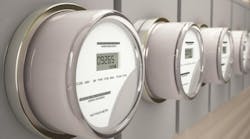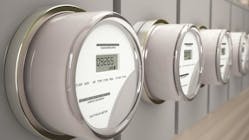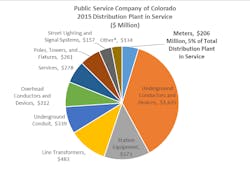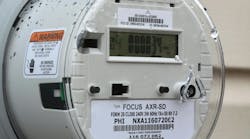Xcel has filed a request with the Colorado Public Utilities Commission for an “Advanced Grid Intelligence and Security” (AGIS) upgrade. A decision is not expected for months.
Xcel said the new meters and support systems will improve power reliability, allow for better integration of rooftop-based solar power systems into the larger grid and provide customers with more information about their energy use.
Today's advanced electric meters don't look much different, on the outside…
The plan’s total cost of the proposal is about $500 million, Xcel said.
If approved by state regulators, Xcel would roll out the new meters and systems across Colorado between 2017 and 2021.
The meters and support systems also are a key element of a larger plan Xcel announced in January, dubbed “Our Energy Future.” The plan includes building Colorado’s biggest wind farm, adding more solar power supplies, testing large and small battery storage systems and changing the way it charges customers for their power by creating a monthly fee.
“The utility industry is undergoing significant change in the way it provides and manages power,” said David Eves, president of Xcel’s Colorado division, in a statement.
“At the same time, our customers are becoming increasingly interested in new technologies, such as advanced home applications, battery storage, private solar and electric vehicles. The advanced power grid is the foundation that will enable the reality of Colorado’s energy future,” he said.
The new meters, plus communications equipment and software, will be able to provide information about customers’ power use, down to 15-minute intervals.
They also will be able to send more information to the utility about how the system is operating.
The current network of meters transmits usage information when an Xcel workers drive down the street as part of the monthly billing process. But the older meters don’t communicate with the utility about the network — meaning Xcel often doesn’t know about a power outage until customers call to complain.
The new meters will be able to communicate power use in something close to real time. They also will have “last gasp” capability, the ability to send a signal to the utility about an outage before it falls silent.
Xcel officially is requesting a “Certificate of Public Convenience and Necessity” or CPCN, which would allow the utility to recover the costs of the new meters and systems from customers via their monthly bills.
Analysis: How Massive?
As reported in The Denver Business Journal, Xcel Energy Inc. has asked Colorado regulators to approve a $500 million meter infrastructure related upgrade.
The Denver Business Journal report uses the term “massive” to describe the requested expenditure. While half a billion dollars is indeed massive in comparison to the typical $100 per month residential electric bill, how massive is it in the context of Xcel’s related asset base?
Utilizing the most recent data from the Energy Information Administration, Public Service Company of Colorado had 1,386,036 electric meters in service in 2015.
While the $500 million expenditure may sound large, when it is spread, as per the plan, over a five year period, it does not seem all that large, compared to 2015 data reported to Federal Energy Regulatory Commission (in the annual FERC Form 1 Report) regarding PS Colorado’s $4.38 billion in related electric distribution system assets (see chart below).
* 'Other' consists of Structures & Improvements, Land and Land Rights, Installations on Customer Premises, Asset Retirement Costs for Distribution Plant and Asset Retirement Costs for Distribution Plant
SOURCE: FERC Form 1, 2015
Details of the Plan
The Xcel Energy plan includes:
- Rolling out an “Advanced Metering Infrastructure,” essentially new meters, for its Colorado electricity customers. Xcel envisions rolling out the equipment between 2018 and 2021.
- Implementing a new technology called “Integrated Volt Var Optimization,” or IVVO, which focuses on ensuring 120 volts of power are flowing smoothly to customers, without much fluctuation which can harm electric motors and equipment. The new technology could be installed starting in 2017.
- Implementing a wireless communication network known as a “Field Area Network,” or FAN, to connect the new, high-tech meters and the volt optimization system to Xcel’s control centers.
The IVVO technology focuses on the flow of electricity, measured in volts, across the grid. Xcel, like all utilities, aims to keep the voltage at customers' outlet at 120 volts, plus or minus 5 percent, said John Lee, Xcel’s senior director of electric distribution engineering. That means the actual voltage can fluctuate as high as 126 volts or as low as 114, depending on how far the customer is from a substation. The IVVO technology “flattens the voltage profile,” meaning that the fluctuations won’t be as wide, he said. “The system operates more efficiently and customers use less power overall,” Lee said.
The plan builds on information gleaned from Xcel’s “Smart Grid City” experiment in Boulder a few years ago, Lee said. “We learned a lot out of Boulder,” Lee said. “And we’ve learned a lot and the industry has evolved a lot since then. The technology that we’re using today is more robust, it would make it a much improved system compared to what we had in Boulder,” he said.
The Boulder “Smart Grid City” experiment included testing a variety of new technologies to monitor power use on and around the electric grid. But it drew criticism when costs rose beyond initial estimates. Xcel had planned to spend about $15 million, but ended up spending $44.5 million partly due to the cost of installing underground fiber-optic communications cables in Boulder’s rocky ground. State regulators in 2013 denied Xcel’s request to recover $16.6 million in costs from customers.




